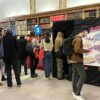Staff writer Diya Nadeem interviews Philip Crowther, a former King’s College London student whose work reporting on the Russia-Ukraine war has been commended worldwide.
As the world becomes more interconnected and the media landscape evolves rapidly, the role of journalists has become increasingly important in shaping public opinion and informing society. One such journalist who has made a name for himself in the field is Philip Crowther, a King’s College London alumni who has carved out a successful career in journalism.
Roar: Could you tell us a bit about your current job and position?
Crowther: I work for The Associated Press, also known as AP, the news agency based in the United States. I am AP’s International Affiliate Correspondent, the on-camera journalist for our television partners. This means I do reports for TV channels around the world that request a live update from a big breaking news event. I do these live reports in six languages: English, French, Spanish, Portuguese, German, and Luxembourgish. I am lucky to be able to travel around the world to the biggest news events. For example, I am now preparing for my eighth trip to Ukraine to mark the anniversary of Russia’s invasion.
R: How has your experience been reporting in hostile environments and how is it different to reporting in other environments?
C: In Ukraine, other reporters do the truly risky frontline reporting. When I go, I am usually based in Lviv or Kyiv, cities that have largely been spared, though the capital has been hit by indiscriminate Russian missile and drone attacks over recent months. The big difference between reporting from a war zone and any other type of reporting is, of course, the risk, but there’s also a difference in the sense of awareness that you have to have, and in the feeling of responsibility to get things absolutely right. You are, after all, one of the very few people who are witnessing the story unfold in real-time. Your own safety, that of your colleagues, and, indeed, that of your competitors come first. So, you might miss a story or an action shot, but if your gut instinct tells you to stay back then that’s what you do. My only true frontline reporting experience was in Libya in 2011 during the revolution. That very dangerous experience still stands me in good stead, as does the training I receive for hostile environment reporting.
R: Having worked as both a radio and TV journalist, how do they differ?
C: Both are a lot of fun. On the radio, you need to let sound and good interviews do the talking and, in television, it’s, of course, the pictures that will catch a viewer’s attention. But there’s much more to it: writing to pictures and knowing when to let the images speak for themselves is a skill that only the best broadcast journalists possess. The main difference, though, comes down to logistics: doing radio is less cumbersome than television, though modern technology and the mobile phone have started to make that contrast disappear. Nowadays your camera is smaller than a sound recording device was when I studied broadcast journalism.
R: What has been the most treasured achievement/milestone within your career?
C: Over the last year, it’s been very gratifying to get recognition in my home country of Luxembourg. My parents came to a ceremony where I received a National Day honour from the Grand Duke for my reporting in six languages from Ukraine. That was a moment for my scrapbook. I’m quite proud to do this work for a respected news organisation like AP, an agency that is world-renowned for getting its facts right and never letting opinion enter its reporting. At a time of fake news and particularly partisan journalism, factual reporting is more important than ever.
R: How did your degree at King’s help you with your career and journey post-graduation?
C: I am lucky to be able to combine my interests and my studies in my current job: I studied Hispanic Studies at King’s and, a year later, Broadcast Journalism at LCC (London College of Communication) across the river. At King’s, I was able to study Portuguese as well, which is one of the languages I now use on air. My tutors in the Spanish department on the Strand were wonderfully passionate about the language and culture of the Spanish-speaking world. One of the great things about this foreign language education is that I can now interview many people without the need for an interpreter.
R: What is your fondest memory of your time at King’s College London?
C: The Strand campus was a great place to study, but also to make friends, largely within the same department. My fondest memories come from the football pitch, though. Playing for King’s on the weekends was something I looked forward to the whole week. Our team gave me the chance to make friends from other fields of study too. And it gave me a sense of identity and pride too.
R: How do you think university affected who you are today?
C: I do think university makes you into a more critical, questioning thinker. King’s did that for me, but so did the location: London was an endlessly interesting place to be during my studies. Studying in one of the world’s most cosmopolitan cities certainly left its mark on me.















